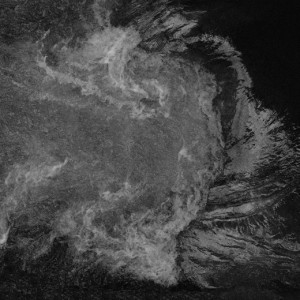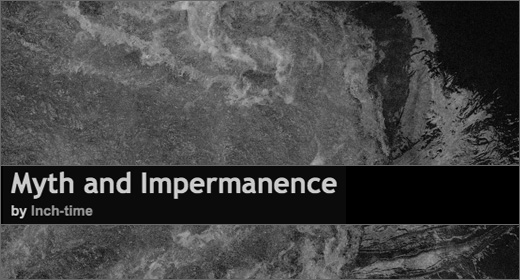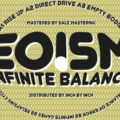Inch-Time rises from his laptop and drafts real jazz instrumentation.

[Release page] Inch-Time is Australian-born Londoner Stefan Panczak and Mystery Plays his own imprint. I first encountered him on a handsome little CDR released by handsome little Static Caravan Records shortly after his first full-length releases on the same label. What begins with soft, minimalist piano embarks on a foray to a Far East of the mind before its circular narrative returns to homey, reassuring, slightly treated baby grand piano. It’s a beautiful little disc.
The Floating World was Inch-Time’s first release on Mystery Plays. It is an album of many-influenced inflections, all executed with an air of cool, calm collectedness that allows the listener to confidently leave the controls in Panczak’s hands and enjoy the heartening melodiousness. While none flows more fluidly than “Electric Blue,” neuron massaging synth, futuristic interstellar travel, dub, jazz, the smooth lounge of “Two Courtesans,” hair-stroking harp and the odd tune that cries out for lyrics, like “Of Times Past,” all enter a smooth slipstream and glide, before turning into blue powder on “Ukiyo.”
Shortly thereafter, the single disc album was turned into a polka-dotted, grand-opening celebration featuring an extra disc packed with remixes. While faithfully following the original track order, some make truly pertinent commentary on the originals—moving “Two Courtesans” further eastward, igniting light and sparks on “Electric Blue” and disresting “The Big Sleep” (Panczak’s own remix contribution). Others prefer to lightly slice and dice their tracks instead of going with Inch-Time’s flow. For Benge, from whom Panczak borrowed the rhythms on The Floating World is reserved the honour of the closing remix, right before those of Lake Lustre and Isan, whose retellings are playful and colourful favourites.
For Myth and Impermanence, Inch-Time rises from his laptop and drafts real jazz instrumentation—trumpeter Alex Bonney, bassist Olie Brice and drummer Karl Penney—playing over basic electronic tracks recorded in advance by Panczak. He provided some instruction as to motif and melody but otherwise left the trio to improvise, some times joining in on vibraphone and keyboards. Panczak calls it a concept album transporting us to the “world of myths and dreams”—the same world of “thought objects,” to the floating world?
Not quite. More like its dark mirror world. On the rare occasion, like “The Sun Myth” and “Night Falls,” it can get very draggy, as the improvisers seem to search for inspiration that never materializes. However nocturnal, there is more of an “after hours” than “alone in the dark” feeling to “Woods,” a hip confidence that can ooze only from a well-played Rhodes piano—the only guest turn on the album by Toby Winton-Brown. The spooky piano of “Black Mountain” leads a trembling trumpet by the hand, and “Home,” though acoustically warmer, is not quite comfy and cozy. In contrast with The Floating World, Myth and Impermanence fumbles in shadow. Perhaps Inch-Time should not go out in the dark.
Myth and Impermanence is available on Mystery Plays. [Release page | Bandcamp]

















![Hasbeen :: Bunker Symphonies II (Clean Error) — [concise]](https://igloomag.com/wp/wp-content/uploads/2025/04/hasbeen-bunker-symphonies-ii_feat-75x75.jpg)
![Extrawelt :: AE-13 (Adepta Editions) — [concise]](https://igloomag.com/wp/wp-content/uploads/2025/04/extrawelt-ae-13_v_feat-75x75.jpg)
![Beyond the Black Hole :: Protonic Flux EP (Nebleena) — [concise]](https://igloomag.com/wp/wp-content/uploads/2025/04/beyond-the-black-hole-protonic-flux_feat-75x75.jpg)
![H. Ruine, Mikhail Kireev :: Imagined / Awakenings (Mestnost) — [concise]](https://igloomag.com/wp/wp-content/uploads/2025/04/h-ruine-mikhail-kireev-imagined-awakenings_feat2-75x75.jpg)


![Squaric :: 808 [Remixes] (Diffuse Reality) — [concise]](https://igloomag.com/wp/wp-content/uploads/2025/04/squaric-808-remixes_feat-75x75.jpg)

